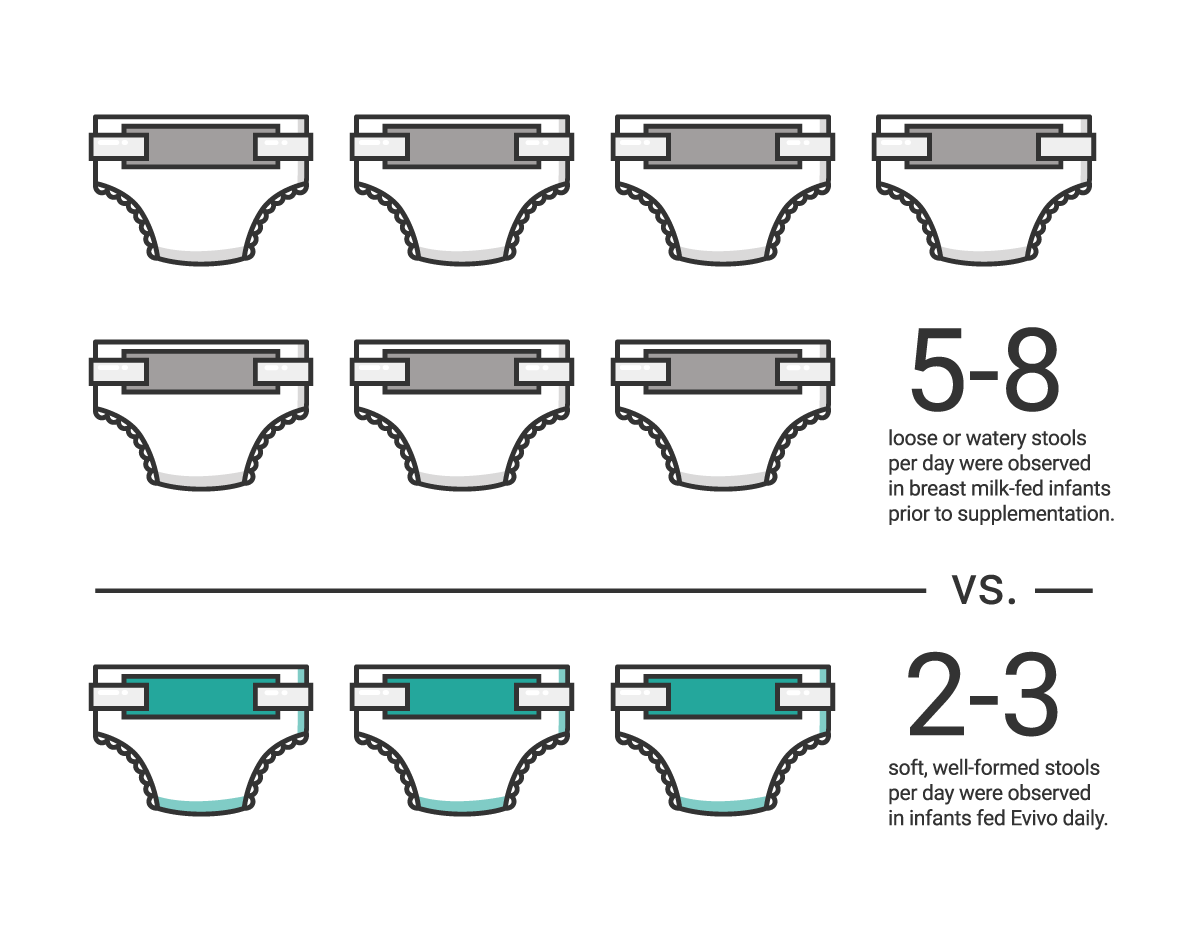
Evidenced-Based Info and Essential Advice for New Parents or Soon-To-Be Parents
Spit ups, reflux, “colic”, and new mothers feeling that “something is wrong with me” – these are issues which are occurring much too frequently. Avoiding too much coffee and brussels sprouts and cauliflower can only help so much. It’s important to be informed and understand the evolution of the human body and what is needed for baby, so you can know:
- Why your baby is experiencing these symptoms and how probiotics can help decrease and diminish them
- You can get rid of guilt from thinking that something is wrong with your breastmilk
- Learn a solution which can restore baby’s gut microbiome, and decrease digestion issues and fussiness
Introducing Evivo probiotics for newborns and babies: Implemented in Hospital NICU’s with MCT Oil and given to preterm infants, Evivo Probiotics are now available to provide to your Little One at home.
“If we give a probiotic, their [a premature baby’s] chance of getting Necrotizing enterocolitis goes down,” says Mark Underwood, who is chief of Pediatric Neonatology at UC Davis and a professor of pediatrics. In fact, at UC Davis Children’s Hospital, all preemies born under a certain birth weight are now given probiotics. It’s become a common practice in other countries including Australia, Japan, Sweden and Finland, Underwood says. This is because probiotics can help prevent a very serious intestinal inflammation called Necrotizing enterocolitis in preemies.
Research on Evivo Probiotics
- In Evivo’s Clinical Trial, Evivo restored infants’ gut microbiome 100% of the time
- Babies given Evivo probiotics showed 80% reduction in potentially harmful bacteria such as E. coli, clostridia, Staph and Strep; babies who did not receive Evivo had more than 4 times the level harmful bacteria versus the babies given Evivo
Gone are the days that the word “bacteria” just means something bad. This is because there is also good bacteria which is essential in balancing your gut flora. Good gut environment equals better immunity and resistance to disease. Research studies have shown that colic, eczema, allergies, diabetes, and obesity are all related to how much good vs. bad bacteria was collected within the first few months of life. We need more good bacteria to be present in the gut to decrease bad bacteria. Unfortunately, an increasing number of babies experience disruption in their bellies that actually cause bad bacteria to thrive.
Consequences of a Disrupted Gut
- 9.6 million children under the age of 18 have eczema; of this total, 3.2 million children (33%) have moderate to severe cases (National Eczema Org)
- There are at least two children with food allergies in almost every kindergarten classroom (FARE)
- Over one million children in the U.S. have type 1 diabetes (American Diabetes Association)
- The rate of obesity doubles as children grow from toddlers to teens (CDC)
Why is Evivo Important for Babies?
The first 6 months of baby’s life contain many critical developmental milestones. The presence of B. infantis is vital during these crucial early months of life when baby’s metabolism and immune system are developing. Unfortunately, due to modern medical practices and lifestyles, the vast majority (9 out of 10) of American babies no longer receive B. infantis at birth.
How does Evivo Work?
Evivo works to create a protective internal environment in your baby’s gut, and it’s clinically proven to do just that by significantly reducing the abundance of bad bacterias. Evivo probiotics reduce the presence of bad bacteria by restoring B. infantis, a good bacteria that thrives most in the intestines of infants as it helps break down the lactic acid in breast milk. Are you a mom with a baby who exclusively breastfeeds? Then it will be important for you to know that lactose is the only sugar which is naturally found in breastmilk, AND the only sugar babies should be consuming. Evivo only contains lactose and activated B. infantis EVC001. It is gluten-free, and there are absolutely NO artificial additives, colors, dyes, flavors, or preservatives.
Evivo’s scientists are world-renowned experts in the infant gut microbiome and its critical interaction with human breast milk. Over a decade of research and clinical trials at The University of California led to the important discovery that the nutrients in breast milk that have evolved over millions of years to become the perfect prebiotic, or food, for B. infantis, the key good gut bacteria in Evivo. This research concluded that only one bacteria—the B. infantis in Evivo—takes advantage of this unique relationship. The amazing breastmilk nutrients, Human Milk Oligosaccharides (HMOs), feed B. infantis in Evivo, and the B. infantis returns the favor by transforming the HMOs so they can serve as valuable nutrition for your baby. Without B. infantis as much as 15% of the nutrients in your breast milk will be wasted in your baby’s diaper!
Conclusion
Evivo probiotics help you build a strong foundation in your baby’s gut by improving the good flora in your baby’s gut environment, improve digestion, further increases immunity, and decreases the probability of allergies and disease later in life.
[amazon_link asins=’B075JR5BZ5,B0752R8GQG,B075RDZ3WF,B075RFJLSG,B07CP6HCF3,B005LHN9S2,B00TGHNNES,B001PYXMV4′ template=’MyGrid’ store=’heartisticb05-20′ marketplace=’US’ link_id=’447fd183-9d97-11e8-b042-0984654d5218′]


